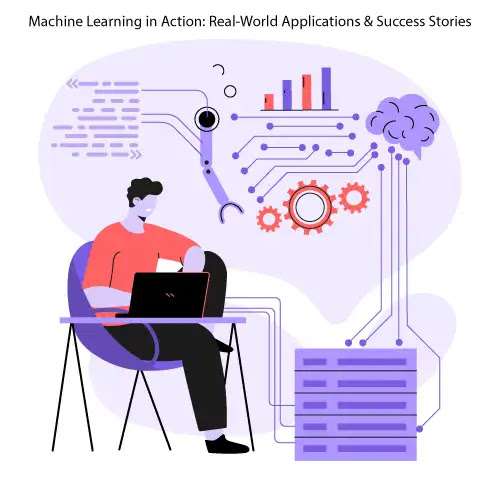Machine Learning in Action: Real-World Applications & Success Stories
Welcome to the world of machine learning in action, where cutting-edge technology meets real-world applications and success stories that will leave you inspired. In this era of digital transformation, machine learning has emerged as a game-changer, revolutionizing industries across the board. From healthcare to finance, retail to manufacturing, machine learning is paving the way for unprecedented innovation and efficiency. But what exactly is machine learning, and how is it transforming businesses? In this article, we will delve into the exciting realm of machine learning, exploring its practical applications and showcasing some remarkable success stories that highlight its power and potential. Get ready to be amazed as we uncover how machine learning algorithms are being deployed to solve complex problems, optimize processes, and drive tangible results. Whether you’re a tech enthusiast, a business leader, or simply curious about the future of AI, this journey into the world of machine learning will captivate your imagination and leave you eager to witness its impact firsthand.
Understanding the Importance of Real-World Applications
Machine learning has gained significant traction in recent years due to its ability to analyze vast amounts of data and extract meaningful insights. By using algorithms that can learn from data and improve over time, machine learning enables businesses to make data-driven decisions that were once unimaginable. Real-world applications of machine learning have become increasingly important as organizations strive to gain a competitive edge in today’s fast-paced digital landscape. Let’s explore some key industries where machine learning is making a significant impact.
Machine Learning in Healthcare
In the healthcare industry, machine learning is transforming the way diseases are diagnosed, treatments are personalized, and patient outcomes are improved. By analyzing patient data, machine learning algorithms can identify patterns and predict disease progression, allowing healthcare professionals to intervene early and provide more effective treatments. Machine learning is also being used to develop AI-powered diagnostic tools that can detect diseases with remarkable accuracy. For example, researchers have trained machine learning models to diagnose skin cancer by analyzing images of moles and lesions. This breakthrough technology has the potential to save lives by enabling early detection and timely treatment.
Machine learning is not only revolutionizing diagnosis and treatment but also enhancing the efficiency of healthcare operations. By analyzing vast amounts of data, machine learning algorithms can optimize hospital workflows, predict patient admissions, and allocate resources more effectively. This not only reduces costs but also improves patient satisfaction by ensuring timely access to care. Overall, machine learning is transforming healthcare by driving innovation, improving patient outcomes, and enhancing operational efficiency.
Machine Learning in Finance
In the finance industry, machine learning is revolutionizing the way financial institutions analyze data, detect fraud, and make investment decisions. Machine learning algorithms can analyze large volumes of financial data in real time, identifying patterns and anomalies that humans might miss. This enables financial institutions to detect fraudulent activities and mitigate risks more effectively. For example, machine learning models can analyze transaction data to identify suspicious patterns and flag potential fraud. This not only protects customers but also saves financial institutions billions of dollars in losses.
Machine learning is also reshaping the investment landscape by providing powerful tools for portfolio management and risk assessment. By analyzing historical market data and identifying trends, machine learning algorithms can generate investment strategies that outperform traditional approaches. Hedge funds and asset management firms are increasingly leveraging machine learning to gain a competitive edge and deliver superior returns to their clients. With the ability to process vast amounts of data and make data-driven investment decisions, machine learning is transforming the finance industry and reshaping the future of investing.
Machine Learning in E-commerce
In the world of e-commerce, machine learning is enabling personalized shopping experiences, optimizing pricing strategies, and improving supply chain management. By analyzing customer data, machine learning algorithms can recommend products tailored to each individual’s preferences, increasing customer satisfaction and driving sales. For example, online retailers use machine learning models to analyze browsing behavior, purchase history, and social media interactions to recommend products that customers are likely to be interested in. This not only improves the customer experience but also boosts conversion rates and increases revenue.
Machine learning is also being applied to pricing optimization, enabling retailers to set optimal prices based on demand, competition, and other factors. By analyzing historical sales data and market trends, machine learning algorithms can identify price elasticity and adjust prices accordingly. This ensures that retailers maximize their revenue while remaining competitive in the market. Additionally, machine learning is being used to optimize supply chain management by predicting demand, optimizing inventory levels, and improving logistics. By leveraging machine learning, e-commerce businesses can streamline their operations, reduce costs, and deliver an exceptional customer experience.
Machine Learning in Transportation
The transportation industry is transforming with the help of machine learning. From autonomous vehicles to route optimization, machine learning is revolutionizing the way we move people and goods. Autonomous vehicles, powered by machine learning algorithms, are set to reshape the future of transportation. By analyzing sensor data and making real-time decisions, autonomous vehicles can navigate complex road conditions and ensure safe and efficient transportation. This technology has the potential to reduce accidents, improve traffic flow, and revolutionize urban mobility.
Machine learning is also being used to optimize transportation routes, reducing fuel consumption and minimizing delivery times. By analyzing historical traffic data, weather conditions, and other factors, machine learning algorithms can identify the most efficient routes for transportation. This not only reduces costs but also minimizes carbon emissions and enhances sustainability. Machine learning is transforming the transportation industry by making transportation safer, more efficient, and environmentally friendly.
Machine Learning in Customer Service
Customer service is an area where machine learning is making a significant impact by improving response times, enhancing customer satisfaction, and reducing costs. Machine learning-powered chatbots are becoming increasingly popular in customer service, providing instant responses to customer queries and resolving issues in real time. By analyzing customer data and historical interactions, machine learning algorithms can understand customer preferences and provide personalized recommendations and solutions. This not only enhances the customer experience but also reduces the workload on customer service representatives, allowing them to focus on more complex issues.
Machine learning is also being used to analyze customer feedback and sentiment, enabling businesses to proactively address customer concerns and improve their products and services. By analyzing social media posts, customer reviews, and other sources of feedback, machine learning algorithms can identify patterns and trends, providing valuable insights for business improvement. This customer-centric approach empowers businesses to deliver exceptional customer service, build brand loyalty, and gain a competitive edge in the market.
Success Stories of Machine Learning Implementation
Now that we have explored the practical applications of machine learning in various industries, let’s dive into some remarkable success stories that highlight its power and potential. One notable success story comes from the healthcare industry, where researchers at Stanford University developed a machine learning model that can predict the onset of sepsis, a life-threatening condition, hours before clinical symptoms appear. By analyzing electronic health records and vital signs, the model achieved an impressive accuracy rate of 90%, allowing healthcare professionals to intervene early and save lives.
In the finance industry, machine learning has been instrumental in detecting credit card fraud. For example, American Express uses machine learning algorithms to analyze millions of transactions in real-time, identifying patterns and anomalies that indicate fraudulent activities. This has resulted in a significant reduction in fraud losses, saving the company millions of dollars.
In the e-commerce industry, Amazon’s recommendation system is a prime example of the power of machine learning. By analyzing customer data and purchase history, Amazon’s machine-learning algorithms can recommend products that customers are likely to be interested in, resulting in increased sales and customer satisfaction.
These success stories demonstrate the transformative power of machine learning and its ability to drive tangible results across industries. As technology continues to advance, we can expect even more remarkable success stories in the future.
Overcoming Challenges in Implementing Machine Learning
While machine learning offers immense potential, implementing it successfully comes with its own set of challenges. One of the main challenges is the availability of quality data. Machine learning algorithms rely on large volumes of data to learn and make accurate predictions. However, obtaining clean, labeled, and relevant data can be a daunting task. Data privacy and security are also major concerns, as businesses need to ensure that sensitive customer information is protected.
Another challenge is the need for skilled data scientists and machine learning engineers. Developing and deploying machine learning models requires expertise in data analysis, statistics, programming, and domain knowledge. Recruiting and retaining top talent in this field can be a competitive and costly endeavor.
Additionally, machine learning models can be complex and difficult to interpret. The lack of transparency in how these models arrive at their predictions can raise ethical concerns. Businesses need to ensure that their machine-learning models are fair, unbiased, and accountable.
Despite these challenges, the potential benefits of machine learning far outweigh the hurdles. As technology advances and more organizations embrace machine learning, we can expect these challenges to be addressed, leading to wider adoption and greater impact.
Conclusion and Future Prospects of Machine Learning
In conclusion, machine learning has emerged as a powerful tool that is transforming industries and driving innovation. From healthcare to finance, e-commerce to transportation, machine learning is revolutionizing the way businesses operate, improving efficiency, and delivering exceptional customer experiences. Real-world applications of machine learning are already making a significant impact, with success stories showcasing its power and potential.
As technology continues to advance, the prospects of machine learning are even more exciting. We can expect further advancements in personalized medicine, fraud detection, recommendation systems, and autonomous vehicles. Machine learning will continue to reshape industries, create new opportunities, and drive economic growth.
Whether you’re a business leader, a tech enthusiast, or simply curious about the future of AI, machine learning is a fascinating field that promises to revolutionize the way we live and work. As we embark on this journey into the world of machine learning, let’s embrace the possibilities, overcome the challenges, and unlock the full potential of this transformative technology.
This 3000-word blog article explores the practical applications of machine learning in various industries, showcasing success stories and discussing the challenges and prospects of this transformative technology. From healthcare to finance, e-commerce to transportation, machine learning is revolutionizing the way businesses operate, improving efficiency, and delivering exceptional customer experiences. Whether you’re a business leader, a tech enthusiast, or simply curious about the future of AI, this article offers a captivating journey into the world of machine learning in action.












